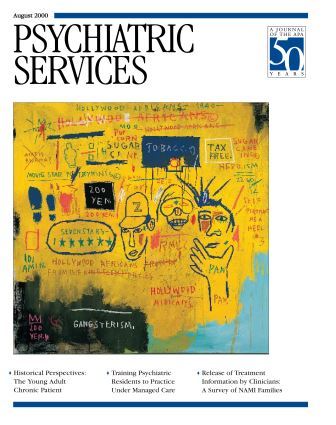Medicare's Mental Health Coverage
To the Editor: I read with interest the article by Mickus and associates (1) in the February 2000 issue, which surveyed Michigan residents about their knowledge of mental health benefits and preferences for type of mental health providers. Although the article provided useful information about the lack of understanding of mental health benefits among the general public, the authors' characterizations of Medicare mental health benefits are fairly misleading.
Specifically, the authors state that there are "serious payment restrictions for mental health services under traditional Medicare." That is a relative statement; mental health coverage under traditional Medicare is actually quite generous compared with many private-sector insurance plans (2). In fact, Medicare coverage for inpatient mental health services in distinct units, such as psychiatric wards, and scattered beds in general hospitals is equivalent to that for physical health services. Moreover, as with physical health services covered by Medicare, there are no annual or lifetime day limits for mental health services provided in these general hospital settings.
The authors further note that "Medicare's mental health benefits do not have parity with its general health benefits in terms of inpatient service limits and copayment policies." Although lifetime coverage for mental disorders is limited to 190 inpatient days in specialty psychiatric hospitals, no such limits are placed on inpatient mental health days in general hospitals. In these instances, the equivalencies in coverage for mental and physical conditions in general hospitals represent a form of parity that exceeds even that required under the Mental Health Parity Act of 1996.
In addition, although copayments for outpatient mental health services provided by psychologists have different levels, the authors fail to note that there are equivalent copayment policies for mental versus physical disorders under traditional Medicare in virtually all other settings—inpatient, partial hospital, hospital outpatient clinic, outpatient medication management—and for other types of providers, including psychiatrists and other physicians.
Thus it is misleading for the authors to suggest that there are serious payment restrictions in traditional Medicare, particularly when their own data suggest that approximately 80 percent of those over age 65 who were surveyed reported that, if needed, they would seek mental health care from either a primary care physician or a psychiatrist. Given their data, it is difficult to see how the authors conclude that "Medicare cost limitations may represent a deterrent for a substantial number of older adults."
The Health Care Financing Administration of the U.S. Department of Health and Human Services provides a toll-free number (1-800-MEDICARE or 1-800-633-4227) to answer questions that beneficiaries may have about mental health coverage under Medicare.
Dr. Hennessy is a psychologist and policy analyst in the Office of Health Policy at the U.S. Department of Health and Human Services in Washington, D.C.
1. Mickus M, Colenda CC, Hogan AJ: Knowledge of mental health benefits and preferences for type of mental health providers among the general public. Psychiatric Services 51:199-202, 2000Link, Google Scholar
2. Buck JA, Umland B: Covering mental health and substance abuse services. Health Affairs 16(4):120-126, 1997Google Scholar



